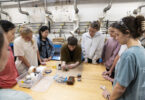This fall, the Graduate School’s Office of Experiential Professional Development will offer the Ph.D. Career Accelerator Program to 25 doctoral students who are interested in pursuing careers in industry, nonprofit administration and higher education administration. This initiative, which is in its second year, is a non-academic certificate program that helps Ph.D. students explore careers beyond the tenure track.
According to the Council of Graduate Schools, Ph.D. candidates often receive limited preparation in the skills and competencies needed to thrive in non-academic career fields. The PCA program helps prepare doctoral students at UGA for these careers using a cohort-based learning model. This model focuses on helping students develop competencies in professionalism, communication, career management, leadership, self-awareness and career domain knowledge through a series of activities.
During the PCA program, participants complete three core sessions that provide them with tools to improve their job search success, such as resume writing and salary negotiation. They also will complete a three-part training series aimed at enhancing their leadership skills. Additionally, students engage in meaningful experiential learning activities such as internships, company site visits and mock interviews. The customizable design of the program enables students to complete these requirements within as little as one calendar year.
Doctoral students who were a part of the inaugural PCA program last year credit it with expanding their perspectives and exposing them to new career paths they had not considered in the past.
“Prior to entry into the Ph.D. Career Accelerator Program, I had a limited perspective of my career path,” said Keenan Lee, a doctoral student in the educational administration and policy program. “The vision for my future career path has changed because of the influence from the PCA program. At first, I could only see my career within K-12 public education. By experiencing activities from the PCA program like internships and workshops, I realized that policymaking and implementation, whether in health care, law or otherwise, would be roles aligned with my personality, interest and skillsets.”
“I found an internship as a UX researcher and I am planning to pursue that path,” said Ameya Sawadkar, a doctoral student in the qualitative research and evaluation methodologies program. “My vision coming into the program was finding somewhere I fit well, and I think I have achieved that part. Now it is time to learn and improve my skills!”
The PCA program also helps students explore their career interests and develop impactful professional relationships through informational interviews. Participants initiate a minimum of five informational interviews as part of the program’s requirements.
“Over the past year, I have met incredible individuals who have challenged me to become the best version of myself,” said Krista Symosko, a doctoral student in the environmental health program. “I am excited to foster my new relationships, learn from each of them, and continue to shape my career following my degree.”
Applications for the 2021-22 PCA program will be accepted until Aug. 15. Doctoral students in all disciplines are welcome to apply. To learn more, visit the PCA application portal.







